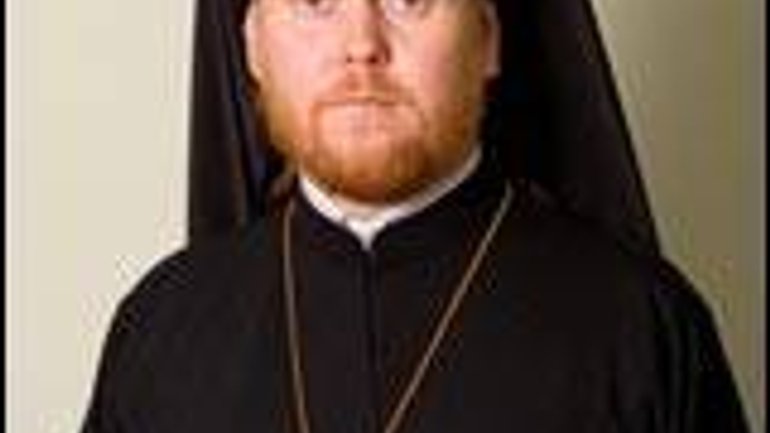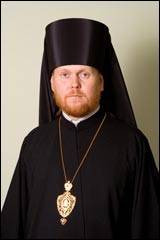If the Patriarchate of Constantinople can propose a realistic model.. then our church.. is prepared to make concessions

 Interview with Bishop YEVSTRATIJ (Zoria), head of the Information-Publishing Department of the Ukrainian Orthodox Church-Kyivan Patriarchate (UOC-KP)
Interview with Bishop YEVSTRATIJ (Zoria), head of the Information-Publishing Department of the Ukrainian Orthodox Church-Kyivan Patriarchate (UOC-KP)
As Kyiv greets Ecumenical Patriarch Bartholomew I of Constantinople, the mother-church of the Kyivan Orthodox church, what assessments can one make of this visit, what is its significance?
The visit of the ecumenical patriarch is a certain break in that matrix of ecclesiastical mutual relations that have gone on in Ukraine for the last 15 years. It is a break in that the patriarch of Moscow, the church of Russia, is losing its monopoly on Ukraine. Up to this time the ecclesiastical diplomacy of Moscow managed fairly effectively to present the problems of the Orthodox church in Ukraine as an internal problem of the Russian church. Those statements that the ecumenical patriarch has already made, the very fact of his visit, regardless of the appearance of opposition and lack of desire on the part of Moscow, still the visit happened and demonstrates that that matrix is broken, that Ukraine now is not considered by universal Orthodoxy as exclusively the internal territory of Moscow. And, correspondingly, problems in the Ukrainian church will not be considered as essentially internal problems of the Moscow Patriarchate.
And it is also clear from the fact that, together with the patriarch, the head of the church of Greece, Archbishop Hieronymos, came, regardless of the fact that Moscow Patriarch Alexis [II, head of the Russian Orthodox Church] sent a letter to him appealing that he not come for the celebration. But an extraordinary Synod of the Church of Greece approved the decision, so that the head of the church of Greece himself headed the celebratory delegation to Ukraine. This also is an important step. In the same way, important was the statement of the patriarch of Jerusalem, heard days before Easter; he said that in vain is the Moscow Patriarchate disturbed by the problems of the spread of the Romanian church in Moldova, and he stated almost to the word thus: “See, Ukraine, this is really the problem and this is the question which needs to be answered.”
This is already hopeful, that a question which had been transformed into a locked, internal Ukrainian circle, when a divided society provoked the division of the church, and the division of the church fed the division of society, it finds the very solution by calling up external intermediaries. If we ourselves, unfortunately, cannot here find mutual understanding, then we really need indisputable authorities who will help us find the faithful path of development for the painful problem of Ukrainian Orthodoxy.
Today in the media there is a discussion that the status of the UOC-KP could change. Rumors are being spread about some secret discussions of the UOC-KP with the Patriarchate of Constantinople. What is the truth, and how prepared is the UOC-KP for such changes?
It is interesting to note that such statements come from the side of representatives of the Moscow Patriarchate. They happen against the background of other statements that the ecumenical patriarch does not want representatives of the Kyivan Patriarchate to be present at those events at which he will be present. That is, from the logical point of view, it is fairly difficult to understand the position of the representatives of the Moscow Patriarchate, from the words that come out, that on the one hand the ecumenical patriarch does not want to see hierarchs of the UOC-KP at the events in which he is participating, and on the other hand, he wants to take them under his jurisdiction. This raises the question: How does he want to do this? By correspondence, not seeing the hierarchs and clergy of the Kyivan Patriarchate?
Certainly, these reports have been spread because of the panic reaction in Moscow to the ecumenical patriarch’s visit to Ukraine, and this is a result of the break in this Moscow matrix in policy regarding to Ukraine. As one of the possible variants of solving the Ukrainian ecclesiastical problem, such a variant more than once has been proposed, including a few years ago. But to say that such a variant is decisive or that it really will happen… for now, such statements are clearly not timely.
Of course, if the issue were such mutual understanding, then unambiguously such discussions would need to be held not by correspondence. Today there is also talk that the ecumenical patriarchate is ready to open its representation in Ukraine in the form of a renewed Kyivan Metropolitanate, which existed up to the end of the 17th century. Such a thought fairly often is accepted as the optimal variant. Do you think that the Kyivan Patriarchate is ready to support such a metropolitanate, join it, and in this way even sacrifice its own patriarchal status, or to sacrifice its autocephaly for such canonical status?
If one is speaking about a certain canonical status, then this question does not trouble us very much. For as His Holiness Patriarch Filaret [Denysenko, head of the UOC-KP] recently stated, if he was concerned about his canonical status, he would never have left the Moscow Patriarchate and would now be head of the Ukrainian Orthodox Church that is part of the Moscow Patriarchate [UOC-MP] and he would have this acknowledged canonical status. So we are not talking about this, to receive some canonical acknowledgement on the part of one national Orthodox church or another in exchange for the status of independence or the status of a patriarchate. Our single motivation, what we want, is, first of all, the union of the Orthodox churches of Ukraine into a single church, and second, the recognition of this Ukrainian national autocephalous church on the part of other national Orthodox churches.
If the Patriarchate of Constantinople can propose a realistic model to achieve these two tasks, renewing church union in Ukraine and receiving acknowledgement of the autocephalous status of the Ukrainian church, then our church for these goals is prepared to make concessions, and fairly significant concessions, but only and exclusively in the framework of the interests of the future of the Ukrainian church.
We are not looking for acknowledgement in exchange for independence; we are not seeking for someone to declare us canonical hierarchs or priests. We ourselves acknowledge ourselves and the faithful Ukrainian people acknowledge us as a church. And so external acknowledgement can only be as a confirmation of our status, but not the main goal of any discussions or contacts.
What is your greatest expectation, hope from this visit of representatives and heads of national Orthodox churches to Kyiv? What would be the ideal or best variant to conclude these celebrations?
In my opinion the best conclusion of the visit would be the announcement of some plan or, so to say, some road map, or some certain considerations which the ecumenical patriarch and hierarchs of the Orthodox churches of the world see for resolving internal Ukrainian church problems. That is, this does not mean that immediately they would be solved. There is no doubt that these have accumulated almost over two decades and cannot be solved in three days. But at least that there would be an outline, a way be shown where it is necessary to go, what needs to be done so that what we are expecting will happen. I think that this would be the best conclusion and the best crowning touch of these celebrations. Right now it is difficult for me to say if such declarations will be made, or will such steps be taken, or will this road be outlined. We will wait for tomorrow’s speech of the ecumenical patriarchate; perhaps in the official speech we will hear certain thoughts which will aim at this.
Today in one discussion a respected representative of the Moscow Patriarchate addressing you said “Your Grace.” Can this be taken as a sign that the UOC-MP is ready and interested in mutual understanding and that it will reject a one-sided approach to the matter of union, which to now was its official position? Do you think they have changed their position recently?
I think that this fact was rather a demonstration of those positions which were heard in the statement in the response of the Holy Synod to our address which was sent to the UOC-MP seven months ago. In this response the thought was heard that, for the sake of the unity of the church, the UOC-MP is ready to refrain from “akribeia,” that is, the harsh maintaining of the canons, for the sake of “economy,” that is, applying them [the canons] with restraint for the sake of carrying out a certain good goal. And so, perhaps, such addresses-appeals can be more readily treated as a certain “economy,” and not as an acknowledgement of our spiritual status as hierarchs, clergy, and, certainly, the Kyivan Patriarchate. Because together with these words also were heard words about non-canonical groups, schism, and so on.
I think that, finally, in the very walls of the MP there is occurring a very complicated internal process and this is the very process of conceptualizing its mission and its role in universal Orthodoxy. For the visit of Patriarch Bartholomew placed a very difficult question before the UOC-MP. For, during a period of 15 years, the informational pole of this church was fulfilled in one way, with statements that all national churches of the world, in union, condemn those whom the MP call schismatics, and this is on the part of the Russian church and the UOC-MP. But the visit which is happening today is clearly happening in opposition to and not in agreement with the Moscow Patriarchate. And in this way these stereotypes which for 15 years the clergy of the MP persistently pushed on their faithful, that all universal Orthodoxy supports their positions, are gradually being destroyed. And so those who belong to the UOC-MP now should make certain conclusions and stand more independently of official Moscow propaganda in their judgments.
Today, when the ecumenical patriarch celebrated vespers, people saw above the church a rainbow; this is a very good sign from God. Perhaps this sign means that soon Ukrainian Orthodox will shake each others’ hands?
If you take into account the fact that for many centuries ecumenical patriarchs had not been in Kyiv, and if you take into account that there was no rain at that moment in Kyiv, but that there really was a rainbow, and you could even see it on the television broadcast… And particularly if you acknowledge that in holy scripture a rainbow is a sign of peace, and the Lord, when he showed this sign to Noah and his sons after the flood, said that this rainbow is a sign that there will no longer be such floods on earth, and when rain comes and a rainbow appears, then Noah will remember this promise of God and will not be afraid. So, perhaps this is really that very sign of God that the time of trials of the Ukrainian church has passed, the time of division has passed, and the time of coming together is approaching. For truly, if it is within human power to organize such events, to show a rainbow in the sky is exclusively in God’s power.
As we Christians say, we always have to leave room for God’s miracles. We hope that soon we will become witnesses of this miracle of God, and the church will be one. Thank you for the conversation?
Taras ANTOSHEVSKYY conducted the interview in Kyiv on 25 July 2008.









